Exploring the Phnom Penh Killing Fields and Tuol Sleng Genocide Museum tour offers a poignant glimpse into Cambodia’s harrowing past under the Khmer Rouge. Participants are guided through the chilling experiences at Tuol Sleng, where personal stories breathe life into history, followed by a somber visit to the Killing Fields. This four-hour tour not only highlights the importance of remembrance but also evokes deep emotional reflections on resilience. As visitors grapple with the weight of these memories, they might wonder how such events shape the narrative of a nation today.
Good To Know
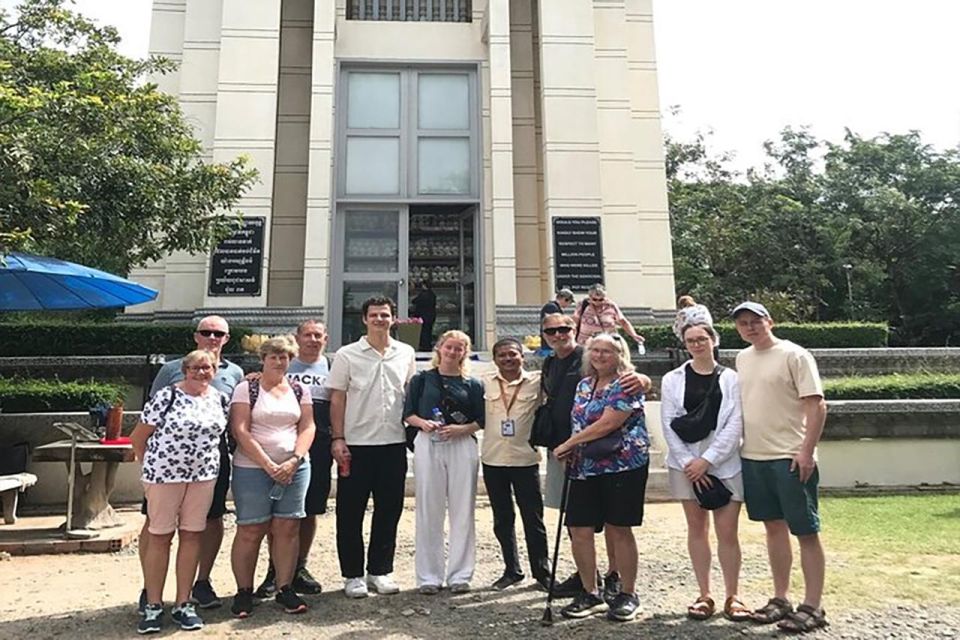
- The tour starts at $17.00 per person, including hotel pickup and professional guiding.
- It consists of a 1.5-hour visit to Tuol Sleng Genocide Museum and 1.5 hours at the Killing Fields.
- A private, air-conditioned vehicle ensures comfortable transportation throughout the tour.
- The tour offers insights into the Khmer Rouge regime’s impact and fosters remembrance and understanding.
- Free cancellation is available up to 24 hours in advance for a stress-free booking experience.
Tour Overview
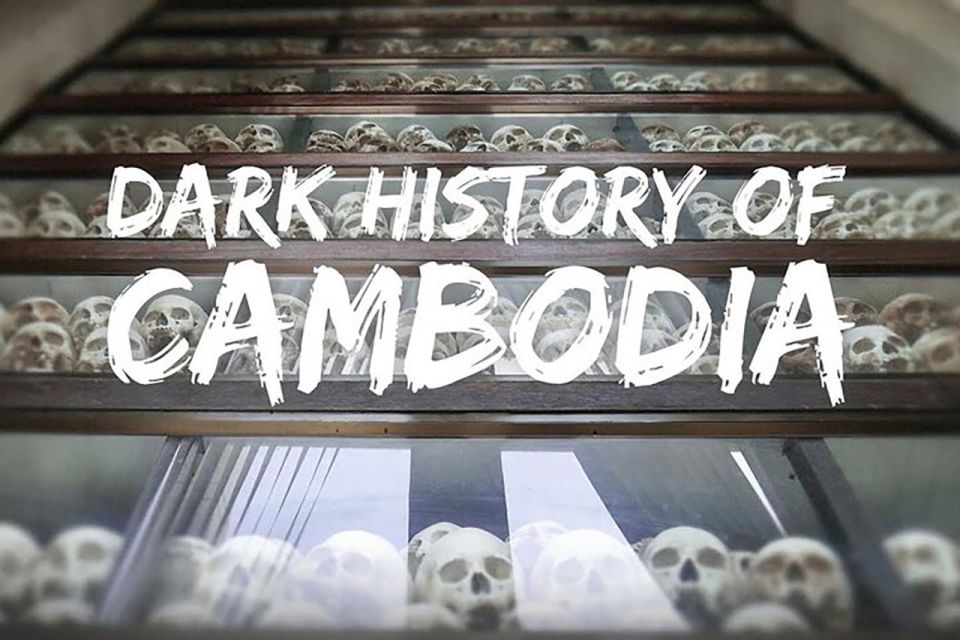
The Phnom Penh Killing Fields & Toul Sleng Genocide Museum Tour offers an insightful glimpse into Cambodia’s tragic past, making it a must-do for history enthusiasts.
Starting at just $17.00 per person, this four-hour tour includes hotel pickup, a professional English-speaking guide, and air-conditioned transportation, ensuring comfort throughout the journey.
Visitors explore two pivotal locations: the haunting Tuol Sleng Genocide Museum and the somber Killing Fields at Choeung Ek. Optional entrance fees apply for both sites, but the guided experience enriches understanding of Cambodia’s history.
With free cancellation available up to 24 hours in advance, it’s a flexible option for travelers.
This tour not only educates but also evokes deep emotions, fostering a connection to Cambodia’s resilient spirit.
You can also read our reviews of more tours and experiences in Phnom Penh.
Itinerary Details
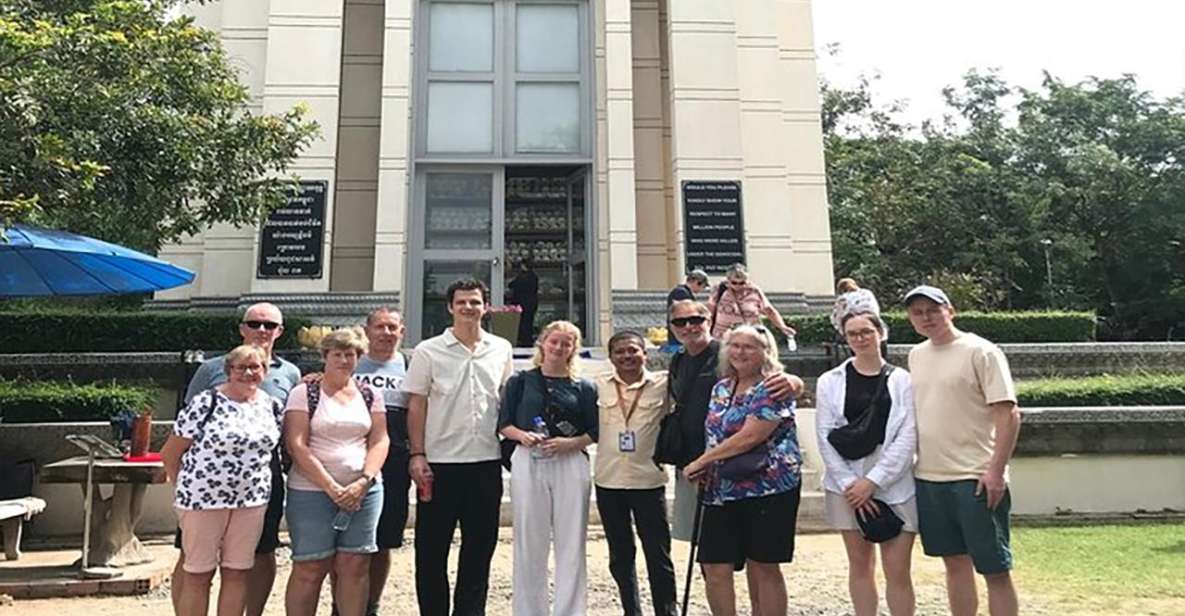
Starting from Phnom Penh, participants embark on a poignant journey that includes guided tours of the Tuol Sleng Genocide Museum and the Killing Fields at Choeung Ek, each offering a profound insight into Cambodia’s past.
The itinerary begins with a 1.5-hour guided exploration of Tuol Sleng, where visitors learn about the harrowing history of this former prison.
Next, they head to the Killing Fields, spending another 1.5 hours in reflection and remembrance.
Throughout the tour, a professional English-speaking guide shares stories and context, enhancing the experience.
After the emotional visits, participants return to their hotels, carrying with them a deeper understanding of Cambodia’s turbulent history.
This tour is a must for anyone wanting to grasp the significance of these historical sites.
Transportation Information
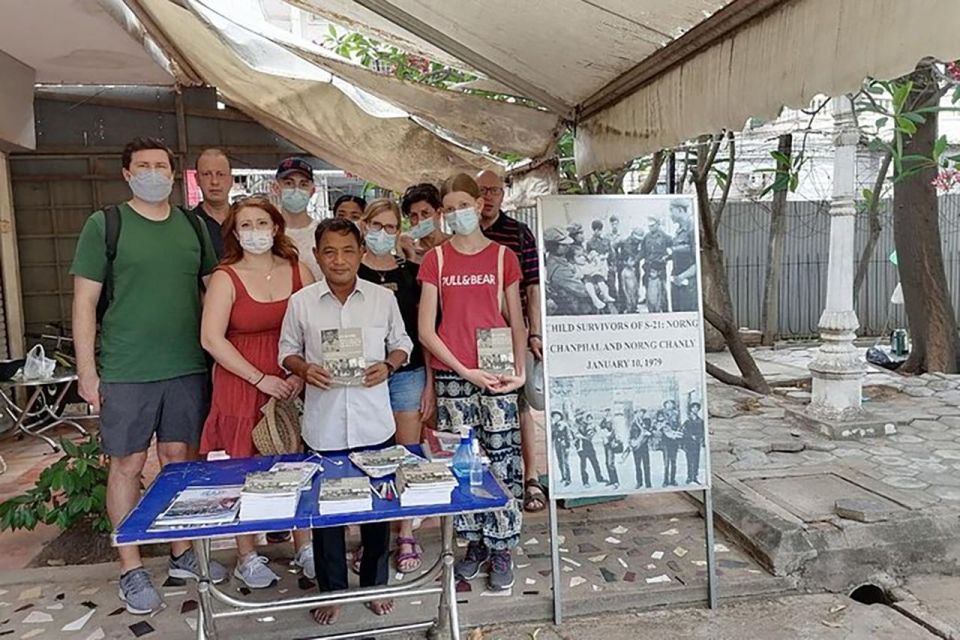
Participants enjoy a comfortable journey in a private, air-conditioned vehicle, ensuring a relaxed environment as they travel between the significant sites of Tuol Sleng and the Killing Fields. The transportation experience is designed to make the tour as seamless as possible.
-
Soft, cushioned seats cradle passengers during the ride.
-
Cool water is provided by the driver, refreshing everyone throughout the trip.
-
Scenic views of Phnom Penh’s streets unfold outside, offering glimpses of local life.
With hotel pickup, participants simply wait in the lobby 10 minutes before the scheduled time. This thoughtful arrangement allows for a smooth start to an emotionally impactful day, making every aspect of the journey memorable and enjoyable.
Customer Reviews
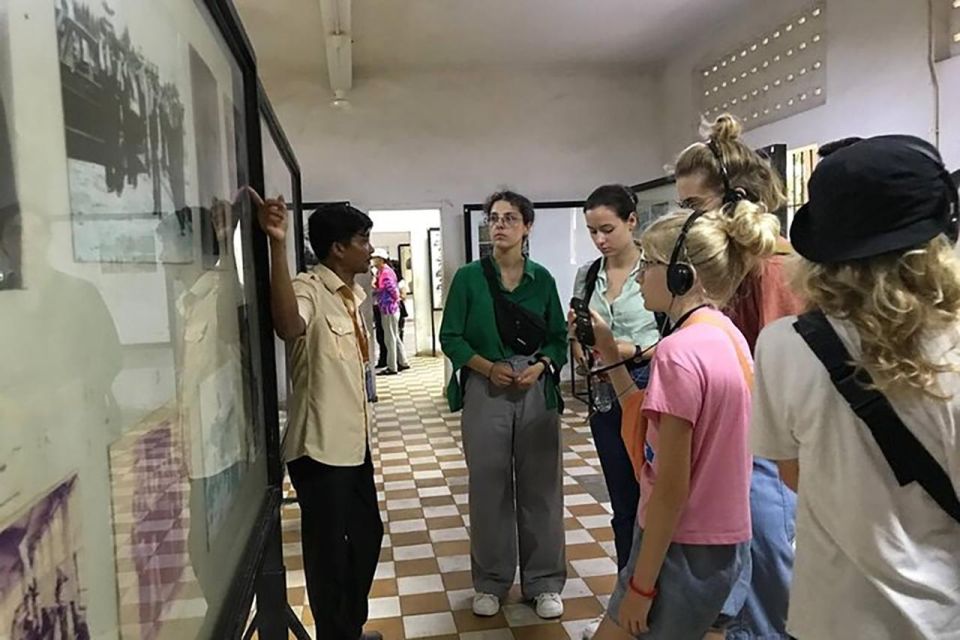
With an impressive overall rating of 5/5 based on 87 reviews, travelers rave about the informative and engaging experiences provided by the tour guides during the Phnom Penh Genocide Museum Tour.
Many reviewers highlight the guides’ ability to convey complex historical narratives with clarity and empathy, making the events of Cambodia’s past feel personal and impactful.
Customers appreciate the organization of the tour, noting smooth hotel pickups and the comfortable transportation provided.
The personal stories shared by guides enhance the experience, allowing visitors to connect on a deeper level.
More Great Tours NearbyHistorical Significance
The Phnom Penh Genocide Museum and Killing Fields tour offers a profound exploration of Cambodia’s tragic history, allowing visitors to grasp the deep scars left by the Khmer Rouge regime.
This journey into the past unveils the harrowing realities faced by millions, fostering a vital understanding of resilience and remembrance.
-
Haunting photographs of the victims, capturing their lives before the tragedy.
-
Silenced echoes that linger in the air, reminding visitors of the atrocities.
-
Memorial steles marking the graves of the fallen, each telling a story of loss.
- Daily Trip Phnom Penh to Siem Reap
- Phnom Penh to Siem Reap by Private Car or Minivan
- Tuol Sleng Genocide Museum (S-21) and Choeung Ek Killing Fields Tour
- A Day Trip Sightseeing Phnom Penh – Siem Reap – Private English Speaking Driver
- Phnom Penh Morning Market & Food Tour by Tuktuk – Includes All Food & Drinks!
- Visit 11 Places in One Day Tour Including S21 & Killing Field
Pricing and Inclusions
Starting at just $17.00 per person, the Phnom Penh Killing Fields and Toul Sleng Genocide Museum tour offers an accessible opportunity to explore Cambodia’s poignant history, complete with essential inclusions for a seamless experience.
This four-hour tour includes hotel pickup, a professional English-speaking guide, and travel in a comfortable, air-conditioned vehicle. Guests can stay refreshed with cool water provided during the trip.
Entrance fees for the Killing Fields ($3) and Toul Sleng Genocide Museum ($5) are additional but reasonable. The tour’s organization and the engaging storytelling of guides enhance the experience, making it both informative and impactful.
With a reputation for excellence, this tour invites history enthusiasts to explore Cambodia’s past meaningfully.
Booking and Cancellation Policy
Guests can easily secure their spot on the Phnom Penh Killing Fields and Toul Sleng Genocide Museum tour, as booking is straightforward and user-friendly. They can choose to book online or through local travel agencies, ensuring a hassle-free experience.
Enjoy seamless hotel pickup right from the lobby, making the start of the journey convenient.
Relish the comfort of an air-conditioned vehicle while sipping cool water provided by the driver.
Flexible cancellation allows guests to cancel up to 24 hours in advance for a full refund, providing peace of mind.
This thoughtful booking and cancellation policy ensures that participants can focus on the emotional and educational journey awaiting them, without unnecessary stress.
Tips for Visitors
To make the most of the Phnom Penh Killing Fields and Toul Sleng Genocide Museum tour, visitors should come prepared with an open mind and a respectful attitude, as the experience delves into Cambodia’s profound and tragic history. It’s advisable to wear comfortable shoes, as there will be a fair amount of walking, and to stay hydrated throughout the tour. Plus, bringing a camera can help capture the poignant moments, but visitors should be sensitive to photography restrictions.
| Tip | Description | Reason |
|---|---|---|
| Wear comfortable shoes | You’ll walk a lot | Ensures a more enjoyable experience |
| Bring water | Stay hydrated | Helps maintain energy levels |
| Respect the site | Honor the victims | Essential for a meaningful visit |
Frequently Asked Questions
What Should I Wear for the Tour?
For the tour, she recommends wearing comfortable clothing and sturdy shoes, as the sites require walking. A hat and sunscreen will help protect against the sun, ensuring an enjoyable experience throughout the day.
Are There Restroom Facilities at the Killing Fields and Museum?
They’ll find restroom facilities available at both the Killing Fields and the museum. Visitors appreciate the convenience, allowing them to focus on the profound historical experiences without worrying about basic needs during the tour.
Can I Take Photos During the Tour?
During the tour, visitors can take photos, but they should be respectful of the somber environment. Guides often share personal insights, enhancing the experience while encouraging thoughtful reflection on the locations’ historical significance.
Is the Tour Suitable for Children?
The tour isn’t particularly suitable for children due to its sensitive subject matter. Parents should consider their child’s maturity level, as the content can be disturbing and may not be appropriate for younger audiences.
Are There Food Options Available During the Tour?
During the tour, there aren’t food options available. However, participants can enjoy refreshments at designated stops. The guides often recommend nearby restaurants for a post-tour meal, ensuring a satisfying experience after the historical exploration.
The Sum Up
The Phnom Penh Killing Fields and Tuol Sleng Genocide Museum tour offers a poignant journey into Cambodia’s history, allowing visitors to connect deeply with the stories of resilience and loss.
As participants walk through the haunting sites, they gain invaluable insights into the struggles endured by the Cambodian people.
This experience not only honors the memories of those affected but also serves as a powerful reminder of the importance of remembrance in fostering a more compassionate future.
You can check availability for your dates here:More Museum Experiences in Phnom Penh
- Killing Fields and Toul Sleng S21 Museum Half-Day Tours
- Phnom Penh :S21 Tuol Sleng Museum & Killing Field with Lunch
- Half Day Trip to S21 Prison Genocidal Museum & Killing Field
- Phnom Penh: killing field & Toul Sleng genocide museum Tour
- Phnom Penh: Killing Fields and S21 Genocide Museum Tour
- Phnom Penh: Killing Fields and S21 Genocide Museum Tour
More Tours in Phnom Penh
- Visiting 9 Places in 3 hours Tour by Tuk-Tuk in the Evening
- Phnom Penh: Full-Day City Tour with Experienced Tour Guide
- Phnom Penh: Private Tuk-Tuk Tour with English-Speaking
- Phnom Penh: Nightlife Hidden Local Bars Tour
- Killing Fields and Toul Sleng S21 Museum Half-Day Tours
- Phnom Phnom: Local Market & Culture Walking of City Tour
More Tour Reviews in Phnom Penh
- Sunset Cruise: Your Cruise You Choose, 3 wonderful options
- Visiting 9 Places in 3 hours Tour by Tuk-Tuk in the Evening
- Scenic Phnom Penh to Siem Reap Transfer with Sightseeing
- Phnom Penh: Full-Day City Tour with Experienced Tour Guide
- Phnom Penh: Private Tuk-Tuk Tour with English-Speaking
- Phnom Penh: Nightlife Hidden Local Bars Tour
Not for you? Here's more nearby things to do in Phnom Penh we have reviewed
- Sunset Cruise: Your Cruise You Choose, 3 wonderful options
- Visiting 9 Places in 3 hours Tour by Tuk-Tuk in the Evening
- Scenic Phnom Penh to Siem Reap Transfer with Sightseeing
- Phnom Penh: Full-Day City Tour with Experienced Tour Guide
- Phnom Penh: Private Tuk-Tuk Tour with English-Speaking
- Phnom Penh: Nightlife Hidden Local Bars Tour
- Phnom Penh: Sunset Cruise with Unlimited Beers & BBQ Buffet
- Kulen Waterfall: Rise and Shine with Cliff, Village w/ Guide
- Killing Fields and Toul Sleng S21 Museum Half-Day Tours
- Phnom Phnom: Local Market & Culture Walking of City Tour
- Phnom Penh: Full-Day City Tour with Royal Palace & Killing
- Phnom Penh: Royal Palace, S21, Killing Fields & More Tour
